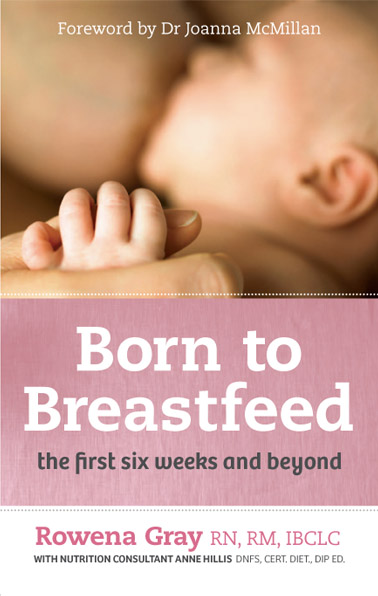Feeling ready to breastfeed? Or thinking you’ll just figure it all out once your baby’s born? The time to learn about and prepare for breastfeeding is in pregnancy, NOT after the big day has arrived! Learning to breastfeed is like learning to dance with your baby – you both have natural instincts but you’ll need some practice to get the timing, positioning and rhythm worked out. And though it may not be smooth sailing from the get-go, with some excellent advice, support from loved ones and the patience to persevere, you and your baby can make breastfeeding work.
has arrived! Learning to breastfeed is like learning to dance with your baby – you both have natural instincts but you’ll need some practice to get the timing, positioning and rhythm worked out. And though it may not be smooth sailing from the get-go, with some excellent advice, support from loved ones and the patience to persevere, you and your baby can make breastfeeding work.
I’ve asked for some expert tips on preparing to breastfeed from my friend, Rowena Gray RN, RM, IBCLC (that means she’s a registered nurse and midwife as well as an International Board Certified Lactation Consultant). She’s also the author of a wonderfully user-friendly book called ‘Born to Breastfeed – the first six weeks and beyond’ (see purchase details below).
Read on for Rowena’s words of wisdom to get you started on your breastfeeding journey!
Rowena Gray’s Guide to Preparing to Breastfeed your Baby
Congratulations on your pregnancy. Breastfeeding can be one of the most wonderful things you will ever experience; however, sometimes it can present as a challenge. I hope these few tips will help you towards a positive breastfeeding experience.
Stay close
Immediately after birth baby will be placed on your bare chest where he will practice his instinctive “breast-seeking” behaviours and learn to find and attach to the breast all by himself. He will have his first breastfeed within the first hour after birth. These very first moments together should be considered sacred – don’t let this very special and crucial time for getting breastfeeding off to a great start be rushed.
These first cuddles are also important for your baby to cover himself in your “good” bacteria which will line his gut and begin his immune protection. 
Skin to skin cuddles start the incredible bonding process between you and your beautiful new baby as well as stimulate your brain to produce breastfeeding hormones (Prolactin and Oxytocin). These hormones are vital to help you to make enough milk so it is important to hold your baby:
- immediately after birth and for the first few hours;
- as many hours of the day in the first few days;
- as often as you can for the duration of your breastfeeding journey. I highly recommend investing in an upright sling to allow you hours of hands-free skin to skin time for as long as you can carry your little one!
Take your time to perfect your craft
Allowing your baby unrestricted and uninterrupted time at the breast will help you to get to know when your baby is hungry and the feeding cues he gives you. It can take a little while to get your confidence with breastfeeding. It’s not always easy from the beginning. Take your time, let your baby take his time and learn together. If you are both comfortable and baby is able to take the milk he needs from your breast then all is working well no matter how it looks!
The best position is one that allows baby to find his own way to the breast and where your hands don’t ‘get in the way’. Be prepared to be bare-breasted at home as you learn together without the hassle of bra straps or tops getting in the way. A comfortable laid back position with baby resting tummy to tummy on you is best. This way baby can find his most comfortable position and usually the best possible attachment because he knows what he’s doing. When we ‘help’ baby attach by way of holding baby and the breast in a prescribed position it invariably leads to poor attachment and damaged nipples. Your baby knows how this works – he needs only your breast, not your hands or pillow!
Whilst there is no “right” way to hold your baby at the breast it is, however, vital that baby is attached to the breast correctly. When you allow baby to attach to the breast for himself you will notice these things:
- His head is tilted back slightly so that his chin comes to the breast first;
- Your nipple rests in the notch between his nose and top lip;
- His mouth is open wide with his tongue dropped to the bottom of his mouth;
- He takes a large mouthful of breast from the bottom to the top;
- He starts sucking instantly and continues to suck and swallowing of milk can be heard;
- Your nipple looks the same shape before and after a feed;
- Your breast feels full or firm at the beginning and softer at the end of a feed;
- It is comfortable for you. (It is normal to have some discomfort immediately after attaching baby but this should ease after a few sucks) .
Let your baby take the lead
Your baby is extremely clever. He knows how often to feed, how long to feed for and how much milk he wants to drink. He will always feed to his appetite so there is no need to wake your baby to feed. He will seek the breast when he is hungry and he will sleep when he needs to rest. Every baby’s feeding needs are different so we cannot compare one baby’s breastfeeding behaviours with another. Breast milk takes approx 45 minutes to 1 hour for baby to digest so it is expected that he will want to feed frequently. He has a tiny stomach that needs small and frequent filling! Follow his lead and you will make enough milk for your baby.
His feeding requirements change from one day to the next in the first week with your breasts producing colostrum for the first few days and then your milk “coming in” on day 3 or 4 (generally). Feeding continues to be very erratic for the first few months. He will soon settle into more of a feeding rhythm after these early weeks. By following his lead through this tricky time your breasts will adjust your milk supply accordingly.
Try not to “over-think” it!
When things get difficult or “tricky” we often try to look for a problem. Parenting a newborn baby is hard work both physically and emotionally. Crying, fussiness, sleepless nights, even a little vomiting can all be considered ‘normal’ infant behaviour at times. Try not to assume things are going horribly wrong from one or two bad days. Often the simplest explanation is the right one!
Trust your ‘mummy gut’ and follow your instincts – hold your baby when you want to; feed your baby when he looks for food regardless of how recently he fed; calm your baby when you sense he is tired; comfort him when you feel he is uncomfortable and unsettled. Dismiss any words of ‘advice’ that do not make sense or sit right with you. If it doesn’t feel right to you then it probably isn’t right for you and your baby. Follow your maternal instincts – they will be right!
Feed around the clock 
Breasts produce milk 24/7. Your breastfeeding hormones fluctuate throughout the day which means that you have a different amount of milk available to your baby at different times of the day. Your baby’s appetite also fluctuates – sometimes he’ll have a snack-sized feed or perhaps a 5-course sized feed. When baby can feed day and night he can take his full daily requirements of milk. Breastfeeding hormones are at their peak overnight which is when you are busiest making milk. Your feeding hormones peak at around 2 or 3am which is when most babies naturally wake to feed – this is nature’s way of protecting your long-term milk supply. Over a period of 6-8 weeks, your baby’s natural feeding patterns will signal your body to regulate your breastfeeding hormones to make enough milk to perfectly match his needs. Feeding frequently day and night as your baby demands will ensure that you make enough milk for your baby. The more baby feeds, the more milk you will make.
*Offering a bottle of formula overnight to help mum to get some sleep will rob her of the needed breast stimulation and drainage to produce enough milk*
Accept help and support from others
Don’t be shy to accept offers of help with cooking, housework, or older children so that you can spend uninterrupted time focusing on breastfeeding. Your partner’s support of breastfeeding will be the single most influence on your decision to battle through any tough times you may face.
Some food for thought…….
The choices you make throughout your labour and birth may have an impact on breastfeeding. Many parents-to-be are not made aware of how their pain relief choices or birthing options can affect initiating breastfeeding. Any medication you receive during labour and birth will cross the placenta to your baby. Whilst all are considered “safe” for both mother and baby here are some breastfeeding facts that may not always be discussed prior to your decision to accept them.
Pethidine
This can delay your milk coming in by up to one week or more. It can also make your baby sleepy and disinterested in breastfeeding which may necessitate interventions that may negatively impact your ongoing breastfeeding experience.
Epidural
This is usually a combination of morphine and Fentanyl, an anaesthetic agent. Fentanyl can cause an “incoordinate suck” in your baby. Whilst this affects a relatively small number of babies, it is difficult and frustrating to manage and lasts for several weeks before resolving spontaneously.
An epidural increases your risk of needing an assisted birth by way of forceps, ventouse or caesarean, all of which have the potential to lead to separation of mum and baby in that vital first hour after birth.
Caesarean
There’s no denying the need for caesarean birth in some circumstances. Birth by caesarean section is, however, associated with the separation of mother and baby at some point in the most important first few hours. Breastfeeding can also be difficult when your freedom of movement to find a comfortable position is limited and you are experiencing pain.
Induction of Labour
The synthetic oxytocin (Syntocinon) used to induce labour competes with the body’s release of natural oxytocin following birth. This inhibits the let-down reflex in the first few days after birth causing baby some difficulty in accessing your milk from the breast. Inductions are also associated with a higher rate of birthing intervention and caesarean sections……
Giving just one bottle…….
Just one bottle can negatively affect your breastfeeding journey. Breastfeeding requires baby to take a large mouthful of breast with his tongue down and out. A bottle teat encourages his tongue to come up and back. If it is not absolutely necessary to give baby a bottle then it is best to avoid them to help get the best start to breastfeeding. Giving baby anything other than the breast in the first few weeks can cause significant sucking confusion resulting in a painful and difficult start to breastfeeding.
Where to get help and when to ask for “more”
- Australian Breastfeeding Association (ABA) helpline 1800 mum 2 mum (1800 686 268).
- Breastfeeding Support Group in your local area. See ABA’s website for your closest group.
- Breastfeeding Drop In Centres. These are staffed by Lactation Consultants and run at Maternal & Child Health Centres or Hospitals. They are free of charge. Contact your local council to find one near you.
- If you are experiencing significant difficulties or would like further support, contact your Lactation Consultant for expert advice. Your GP, obstetrician or paediatrician may not be the best people to ask about breastfeeding difficulties as they usually have very little expertise in managing breastfeeding challenges. Also try to avoid seeking specific advice from your friends and family – what may be helpful for them may not be appropriate for your individual situation.
Get Yourself a Copy of “Born to Breastfeed – the first six weeks and beyond”
More helpful information can be found in my book “Born to Breastfeed – the first six weeks and beyond” available from www.booktopia.com.au , www.amazon.com.au (Kindle) and in your local bookstore.
About Rowena Gray
Rowena Gray is an International Board Certified Lactation Consultant in private practice with a passion to support new mums to find confidence in breastfeeding by getting to know her baby through his cues. She provides one on one breastfeeding consultations in your own home, a written breastfeeding plan to suit your needs and follow up support by phone for 2 weeks after your consultation. All pregnancy and postnatal queries welcomed.
Rowena’s book, “Born to Breastfeed” has been described as having a lactation consultant on your bookshelf. The book is written from the baby’s perspective to help you problem-solve your breastfeeding day-to-day by following your baby’s behaviours. The book includes nutritional advice across the first 6 weeks and beyond for keeping yourself well-fuelled throughout your breastfeeding journey. Born to Breastfeed is intended to be your go-to help desk for all your breastfeeding advice needs!
